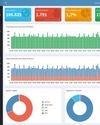
In 2023, the number of people who have written some form of software code at least once is surely orders of magnitude greater than whatever it was in 1991, when Linux was born. That is good, but in my opinion, another very important group should have grown even more in the same period, but didn’t: I refer to the people who have tried at least once to design digital integrated circuits (ICs) – that is, digital hardware instead of software.
This is a pity, because without such circuits no software could exist, and designing them is much more accessible today than it was 30 years ago. My goal in this article, which requires no previous knowledge of digital ICs, is to prove that point – at least for those really important ICs (that can also run Linux), known as field-programmable gate arrays (FPGAs).
The basic flow and core concepts of FPGA design are not intrinsically more difficult than those for efficient software design. However, they are different enough that a complete FPGA tutorial for beginners could well fill half this magazine.
Instead, to tempt even people who have never heard of FPGAs to try designing them, I deliberately cover just the bare minimum necessary to do two things:
1. Understand what ICs really are, why FPGAs exist, how they work, and why they must be designed in a certain way.
Diese Geschichte stammt aus der #271/June 2023: Smart Home-Ausgabe von Linux Magazine.
Starten Sie Ihre 7-tägige kostenlose Testversion von Magzter GOLD, um auf Tausende kuratierte Premium-Storys sowie über 8.000 Zeitschriften und Zeitungen zuzugreifen.
Bereits Abonnent ? Anmelden
Diese Geschichte stammt aus der #271/June 2023: Smart Home-Ausgabe von Linux Magazine.
Starten Sie Ihre 7-tägige kostenlose Testversion von Magzter GOLD, um auf Tausende kuratierte Premium-Storys sowie über 8.000 Zeitschriften und Zeitungen zuzugreifen.
Bereits Abonnent? Anmelden
Tracking your finances with plain text accounting Plain Numbers
If you're tired of tinkering with spreadsheets, using hledger and plain text accounting offers a simpler method for managing your finances without vendor lock-in

Dependency resolution with apt-get and apt Evolutionary Tale
Over the past 30 years, the apt family has played an important role in dependency resolution for Debian distros.

Cryptomining with Litecoin Traveling Lite
Although not as popular as headliners like Bitcoin and Ethereum, Litecoin is one of the oldest crytocurrencies, and it offers some useful features, such as dual-mining with Dogecoin.

Software Update SnoopGod
SnoopGod delivers an Ubuntu-based pentesting distribution with an emphasis on security education.

Kernel Trouble
This deep look at how intruders attack an out-of-date kernel should be enough to convince you of the need to stay vigilant.

Using Wake-on-LAN for a NAS backup Power Saver
Put your backup server to sleep when you don't need it and then wake it on demand using the Wake-on-LAN feature built into network adapters.

Time Travel
Mike Schilli uses a Go program to check whether a strategy for trading stocks is making gains or losses on the basis of historical price data.

URL filtering with Pi-hole Into the Funnel
Supporting browser plug-ins, network-based DNS blockers like Pi-hole help protect you against online tracking and unwanted content.

Artificial intelligence on the Raspberry Pi Learning Experience
You don't need a powerful computer system to use Al. We show what it takes to benefit from Al on the Raspberry Pi and what tasks the small computer can handle.

MakerSpace Manage your greenhouse with a Raspberry Pi Pico W Sheltered Growth
You can safely assign some greenhouse tasks to a Raspberry Pi Pico W, such as controlling ventilation, automating a heater, and opening and closing windows.